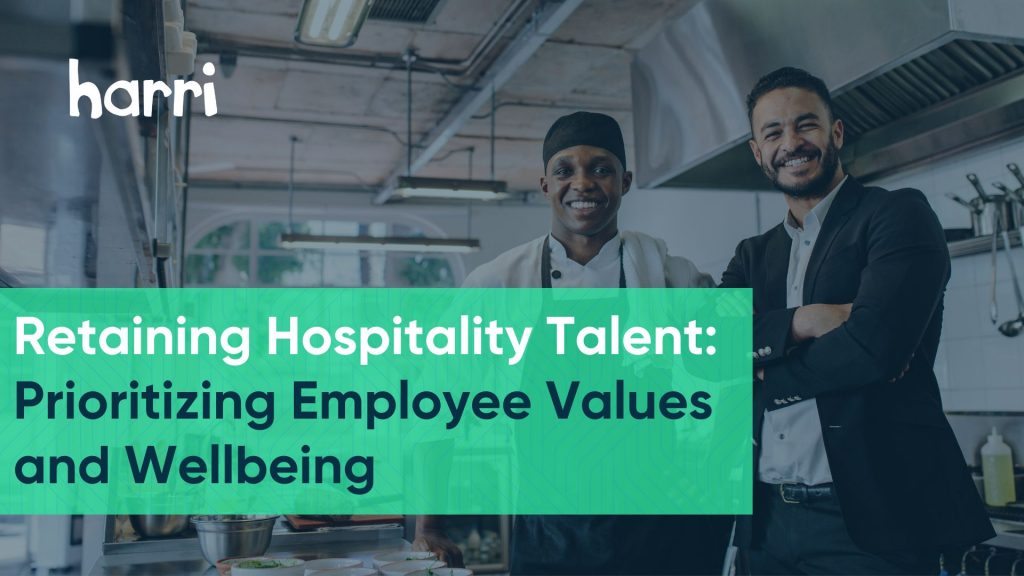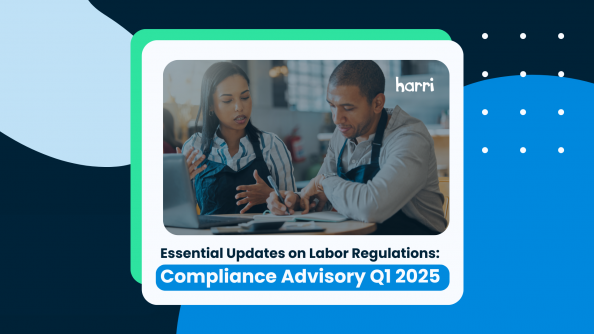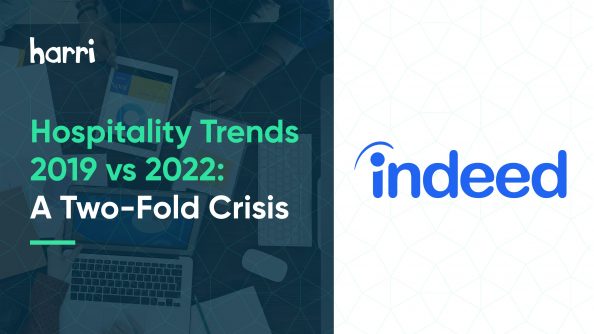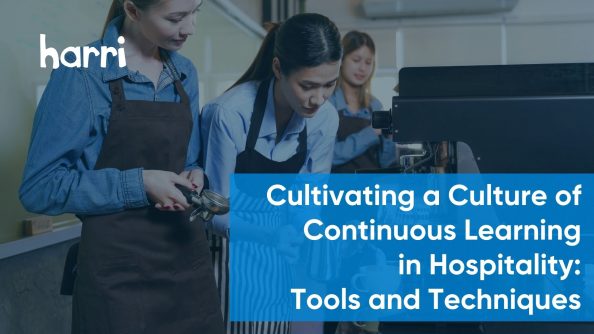Retaining Hospitality Talent by Emphasizing Core Values and Employee Wellbeing

- By Harri Insider Team | March 7, 2024
Hospitality’s employment landscape is reshaping around core principles: honesty, equality, and mutual respect, especially valued by workers aged 18 to 34. This article, drawing insights from Harri and CGA’s comprehensive report ‘Getting Retention Right’, aims to shed light on a fundamental realignment with personal values at work, steering operators to recalibrate their strategies for attracting and keeping talent.
Facing a critical juncture, 91% of hospitality leaders report staffing shortages. This challenge is compounded by the fact that 42% of employees, despite recognizing hospitality’s career potential, contemplate departure due to unmet expectations. Forward-thinking operators are addressing this by aligning workplace realities with their workforce’s values, making them more identifiable to talent as an employer of choice.
Fostering Workplace Values and Well-being
Despite the alarming data, hospitality brands are witnessing a surge in job satisfaction and employee well-being among existing staff. Job contentment has soared, with 74% of staff now satisfied, up by 13 per cent from the previous year. This leap is matched by a significant uptick in employers actively tuning into their teams’ well-being, escalating from 15% to 24%. This positive trend mirrors a deeper commitment to nurturing supportive and vibrant workplace cultures.
Parallel to this, there’s a burgeoning demand for work-life harmony, with employer support for better balance soaring from 19% to 30%. This marks a pivotal move towards more rounded and life-affirming employment practices, signaling a fresh era where work serves as a fulfilling part of life’s mosaic. This evolution speaks to the growing importance of holistic well-being in the hospitality industry and underscores a transformative approach to work culture, aligning more closely with what modern employees value most.

Cultivating a Values-Driven Workplace
Focusing on employee values and well-being directly translates to stronger retention, thus mitigating turnover costs, and preserving resources for growth rather than recruitment. More importantly, the experience you provide your employees is a strong indicator of the service they extend to your customers. A valued and satisfied team elevates the customer experience, reflecting positively on the brand and boosting revenue.
“The best strategy is always investing in your people. Whether it be our corporate team members, franchisees or restaurant staff, understanding your people and taking care of them is the most crucial component to sustainable growth. Our team-oriented mindset is always put first.”
Chris Dawson CEO, Walk-Ons
5 Ways Hospitality employers can prioritize employee values and well-being
- Implement Feedback Systems: Facilitate open dialogue between staff and management, ensuring employees feel heard. Harri Engage makes this extremely simple.
- Flexible Scheduling: Offer scheduling flexibility to accommodate personal needs, improving work-life balance.
- Recognition Programs: Regularly acknowledge and reward employees’ contributions to foster a sense of value and belonging.
- Diversity and Inclusion Training: Invest in programs that promote understanding and respect for all employees, creating a more inclusive workplace.
- Well-being Initiatives: Introduce health and wellness programs, mental health support, and other resources to address the holistic well-being of the team.
To effectively focus on employee engagement and satisfaction, hospitality operators can adopt a data-driven approach. By leveraging platforms like Harri Engage, employers can collect actionable feedback directly from their teams, offering insights into areas of success and those needing attention. This feedback, when analyzed alongside customer satisfaction scores and revenue trends, provides a clear picture of how well-being initiatives influence overall performance. Regularly reviewing these metrics enables operators to fine-tune their strategies, ensuring both employee and customer experiences are consistently elevated, which in turn drives brand loyalty and profitability.
To effectively integrate core values throughout the employee journey, begin by evaluating how your company’s values were established. Did these values emerge from broad employee input, or were they prescribed by leadership? This introspection can guide a more inclusive approach to defining values that resonate across your team.
With well-defined values, weave them into every facet of the employee lifecycle, from recruitment—using value-based interview questions—to onboarding, showcasing real-world applications of these values. Ongoing communications should continually reinforce these values, celebrating instances where employees exemplify them, thus embedding these principles into the fabric of the company culture.

Empowering Leadership to Drive Values Forward
Your frontline leaders play a crucial role in embedding core values deeply into your organizational fabric. By exemplifying honesty, equality, and mutual respect in every decision
and interaction, managers set the standard for the entire team. To empower your managers, provide them with the necessary resources, training, and autonomy to lead by example in embodying the core values.
Initiatives can include leadership development programs focused on ethical decision-making, communication skills for transparent and open dialogue, and regular opportunities for leaders to receive feedback on their alignment with company values. Additionally, recognizing and rewarding leaders who successfully integrate these values into their teams can reinforce the importance of a values-driven approach.
Moreover, consider the development of your future leaders. Providing clear pathways for advancement to frontline team members is key to building a thriving workplace. Mapping out career paths during recruitment, highlighting progression opportunities at performance reviews, and offering the flexibility to change directions and try new roles can all help workers see a positive future in the business. Leveraging an HR system to identify the skills makeup of your current workforce and how employees’ skill sets are a match for new roles can help you to continue to hire and promote from within. Importantly, this approach can boost motivation and satisfaction among employees considering a shift in their career paths.
For a complete understanding of the hospitality landscape, including employee perspectives on values, generational differences, and key insights from industry leaders, download the full ‘Getting Retention Right’ report by Harri and CGA.




















